Adamant Teenager Wants To Adopt A Dog Despite Her Mother's Concerns And Won't Take No For An Answer
Adopting a dog is a huge thing. Reossy, a sixteen-year-old girl on Reddit, recently shared a post on the "AITA" subreddit seeking advice on whether or not she is in the wrong for wanting a dog.
In the post, she reveals that she and her father have been trying to convince her mother to get a dog for some time now, but her mother has not budged. Reossy explains that she had a small dog when she was younger, and it was among what made her childhood fun.
She and her father believe her younger siblings would also benefit from having a dog. However, her mother is worried that she will be the only one taking care of the dog, as she was the primary caregiver for their previous dog during its last weeks.
However, Reossy has promised to help take care of the dog whenever she is home and has also assured her mom that the dog is well-trained. Despite all these efforts, her mom still refuses to grant her request and gets very upset with her each time she brings up the topic.
Reossy wants to know if she is the a-hole in this situation. Here is what the AITA community thinks.
Here's OP's post
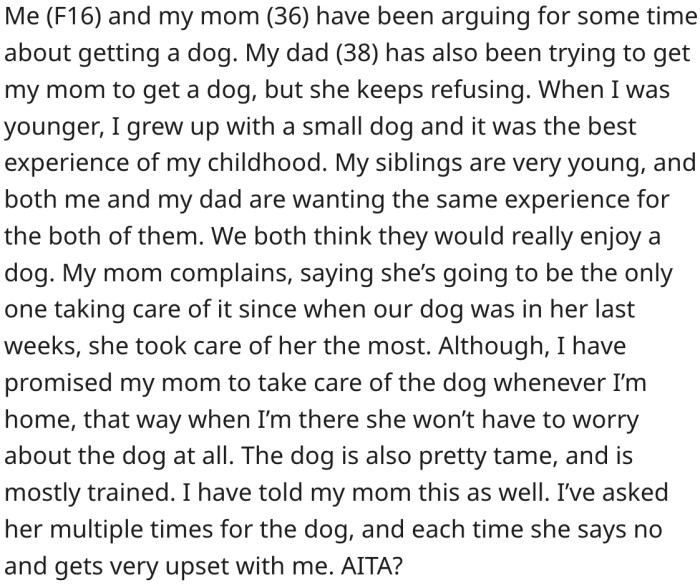
1. When she leaves home, her mother will have to care for the dog.

2. She can get a dog when she moves out.
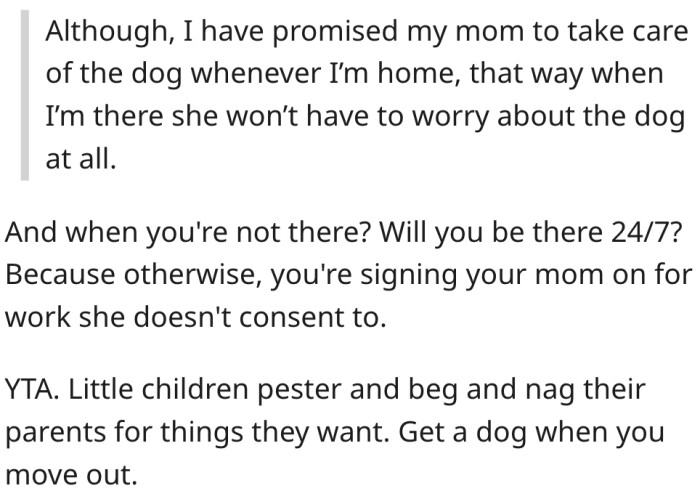
Understanding the Drive for Pet Ownership
Dr. Lisa Montgomery, a developmental psychologist, explains that the desire for a pet often stems from a longing for companionship and emotional support.
Her research indicates that adolescents frequently seek pets as a means to fulfill emotional needs that may not be met in other areas.
This drive can lead to a strong attachment to animals, which may conflict with parental concerns.
The Psychological Aspects of Adopting a Dog
The desire to adopt a dog often stems from a deep-seated need for companionship and emotional support. Research indicates that pets can significantly enhance our emotional well-being, providing unconditional love and loyalty.
Dr. Allen McConnell's studies on pet ownership reveal that having a dog can lead to decreased feelings of loneliness and increased happiness, highlighting the mental health benefits of animal companionship.
3. If she thinks ahead, she may realize that getting a dog isn't a smart choice.
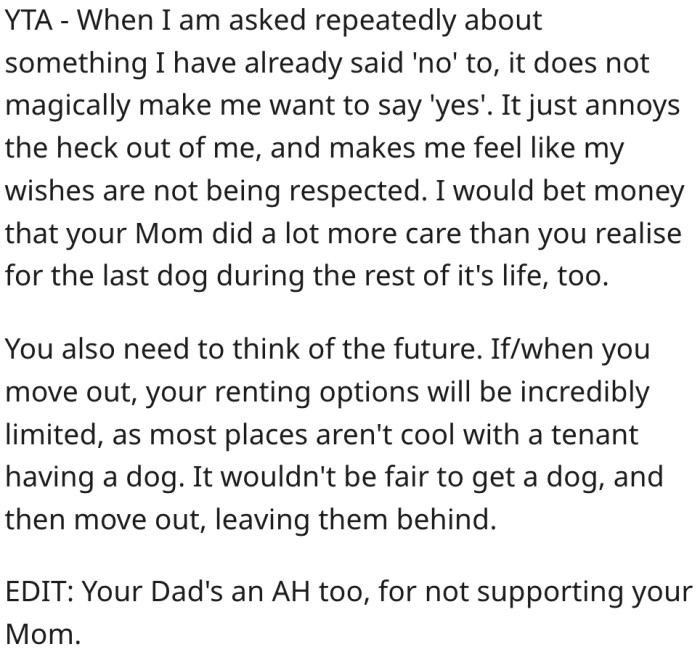
4. It's not uncommon for kids to renege on their promise to care for a pet.

5. "No" means "no".

Interestingly, the push for pet ownership can sometimes lead to familial discord.
A perspective shared by Dr. Shefali Tsabary, parenting expert, states, "When children advocate strongly for a pet, it can create significant tension in family dynamics, particularly around issues of responsibility and care." This sentiment is echoed by Dr. Dan Gilbert, happiness researcher, who notes, "Open communication and understanding are crucial in navigating these discussions to prevent misunderstandings and foster family harmony."
However, the push for adoption can create tension within families, particularly when differing opinions exist. Research in family psychology emphasizes the importance of open communication to address concerns and expectations regarding pet ownership.
Dr. Virginia Satir's therapeutic approach underscores that discussing feelings and responsibilities openly can foster understanding and reduce conflicts within families, promoting harmony.
6. She is trying to cover up her selfish motives with her siblings.

7. Having a dog may have been fun for her child, but it was probably unpleasant for her mom.
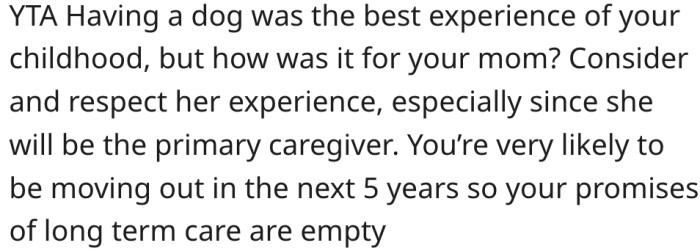
8. Her mother will shoulder most of the responsibility.
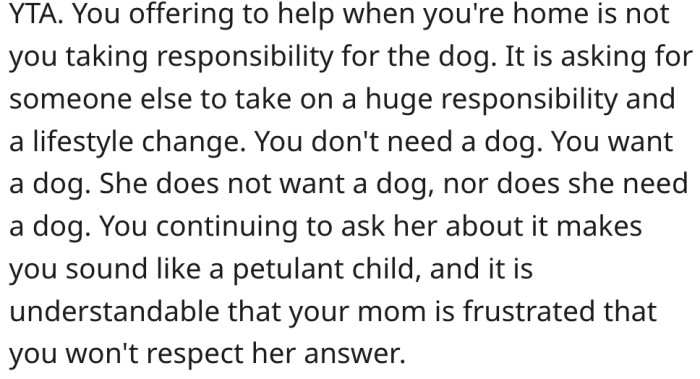
The Importance of Communication in Family Dynamics
Effective communication is vital when navigating the complexities of pet ownership within families.
Research indicates that families who prioritize open dialogue tend to experience less conflict and greater satisfaction.
By fostering an environment where everyone feels heard, families can work through disagreements more effectively.
The Role of Responsibility in Pet Ownership
Adopting a dog involves significant responsibilities that can impact family dynamics. Research indicates that shared responsibilities in pet care can enhance family cohesion and promote teamwork.
Dr. Judith Wallerstein's studies on family dynamics suggest that when all family members participate in caring for a pet, it can strengthen relationships and foster a sense of shared purpose.
9. She should stop pestering her mom.

10. Constantly begging her mom won't make any difference.

11. Whoever owns the house can decide whether to get a pet.

To enhance communication, families can establish regular check-ins to discuss pet care responsibilities and expectations.
Engaging in these discussions can promote teamwork and ensure that all members are on the same page.
This proactive approach can prevent misunderstandings and foster cooperation.
Additionally, it's essential to consider the child's readiness for pet ownership. Research suggests that children should be developmentally prepared to engage in pet care, as this can enhance their sense of responsibility and empathy.
Dr. Alan Beck's work on child development emphasizes that involving children in pet care can teach valuable life skills, promoting emotional and social growth.
12. Moms are used to kids not caring for the pets they adopted.

13. Children don't know that owning a dog is hard work.

14. Who will care for the dog when she's off to college?
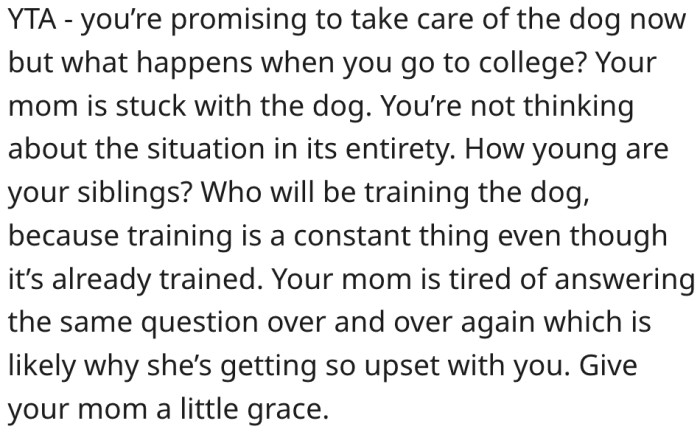
Balancing Responsibilities in Pet Ownership
Balancing responsibilities is crucial for successful pet ownership, especially in families where members have differing views.
Research shows that families who share responsibilities tend to have lower levels of conflict and greater satisfaction.
Implementing structured approaches to pet care can enhance cooperation and reduce tension.
Navigating Family Dynamics When Adopting a Dog
When a teenager insists on adopting a dog against their mother's wishes, it highlights the broader dynamics of family decision-making. Research in family therapy indicates that power struggles often arise during significant decisions, particularly when values and priorities differ.
Dr. John Gottman's research on family relationships emphasizes the importance of negotiation and compromise in resolving conflicts, suggesting that open discussions can lead to mutually beneficial outcomes.
15. Walking a dog is not the same as caring for a dog.

16. They can get a dog if her dad guarantees he will care for it.

17. Her parents have the final say because it's their house.

To facilitate balanced responsibilities, families can create a pet care schedule that outlines specific tasks for each member.
This approach not only clarifies expectations but also reinforces teamwork and accountability.
Involving children in the planning process can further enhance their sense of ownership and responsibility.
Moreover, the emotional implications of adopting a dog should not be overlooked. Research indicates that pets can provide emotional support during challenging times, helping individuals cope with stress and anxiety.
Dr. Lee Berk's studies on laughter therapy reveal that interactions with pets can promote relaxation and improve mood, highlighting the potential benefits of having a dog in the household.
18. Asking for a dog when she'll move out soon is unfair.

19. She should assure her mom that she will take full responsibility for the dog's care.
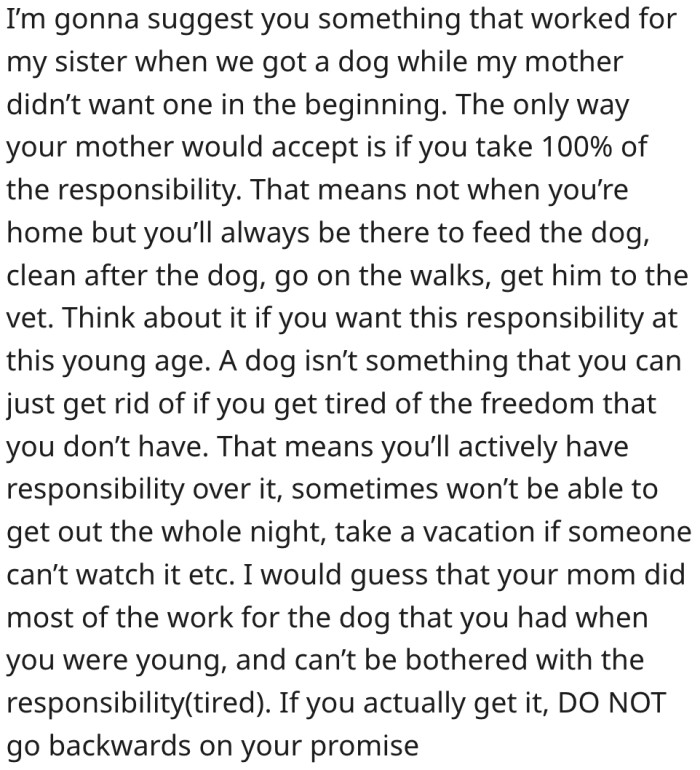
20. If she's serious about caring for the dog long-term, she should draft a detailed plan and show it to her mom.

Fostering Emotional Connections Through Pets
Pets can serve as a vital source of emotional support, particularly for children.
Research indicates that children who have pets often experience increased levels of happiness and emotional well-being.
This bond can help them navigate challenges and foster resilience.
Practical Steps for a Successful Adoption
To ensure a successful adoption experience, families can engage in structured discussions about responsibilities and expectations. Research indicates that clearly defining roles in pet care can enhance family cohesion and prevent misunderstandings.
Dr. Judith Wallerstein's studies on family dynamics suggest that establishing routines around pet care can promote a sense of stability and predictability, benefiting both children and pets.
What do you think?
Caring for a dog is a huge responsibility that children cannot handle. Dogs need to be fed, groomed, walked, and given attention regularly.
This requires dedication, patience, and understanding, which are qualities children may not possess. Additionally, dogs can be expensive and require regular trips to the vet.
It's essential for parents to carefully consider their child's ability to take on such a significant responsibility before deciding to get a dog.
Ultimately, the decision to adopt a dog requires thoughtful consideration of family dynamics and individual readiness. By fostering open communication and shared responsibilities, families can create a supportive environment that allows for a successful adoption experience.
Engaging children in the process can enhance their sense of responsibility and empathy, ultimately enriching family relationships.
Psychological Analysis
This situation reflects the complexities of family decision-making when it comes to adopting a pet. Navigating these dynamics requires open communication and understanding, ensuring that all family members feel heard and valued. It’s crucial to approach this decision thoughtfully, considering the emotional and practical implications for everyone involved.
Analysis generated by AI
Analysis & Alternative Approaches
Research consistently supports that adopting a dog can provide emotional and social benefits for families. By navigating the complexities of family dynamics with open communication and shared responsibilities, families can foster a harmonious environment that supports positive growth.
Engaging children in pet care can enhance their development, teaching valuable life skills while enriching family bonds.
Encouraging positive interactions between children and pets can strengthen these emotional connections.
Activities such as playing, grooming, and caring for pets not only enhance emotional bonds but also promote responsibility and empathy.
These experiences can create lasting memories and foster a nurturing environment.
Analysis & Alternative Approaches
In conclusion, navigating the desire for pet ownership within family dynamics requires effective communication, shared responsibilities, and emotional support.
By fostering open dialogue and encouraging teamwork, families can enhance their connections and successfully integrate pets into their lives.
Ultimately, these strategies can lead to stronger family bonds and a nurturing environment for all members.



